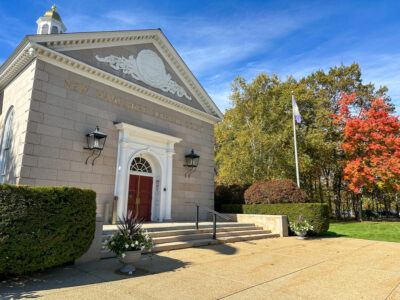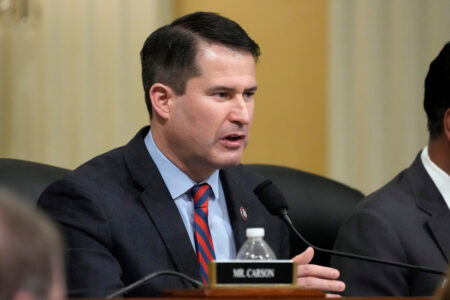Asphalt plant proposal shot down by Planning Board

State Rep. Shelley Devine spoke against the application for an asphalt plant at 145 Temple St. during the June 15 Planning Board meeting. (Photo Courtesy of Nashua Community Television)
NASHUA – City residents have won their battle against the proposed asphalt plant at 145 Temple St. as the Planning Board has voted unanimously not to allow the project to move forward.
The vote was preceded by a torrent of comments from residents who were vehemently opposed to the project.
Jon Naso of Gilson Road said the plant would produce numerous toxins such as hydrogen sulfide “associated with the smell of rotten eggs” and benzine, which is a known cause of cancer.
“A man has the right to do what he wants with this property, but he can’t take our air,” he said during its June 15 meeting.
He also called attention to the children in the neighborhood.
“We have children in the area, we have a school in the area,” said Naso. “Is this what we want to bring to Nashua?”
Attorney Amy Manzelli of BCM Environmental and Land Law, said she met with three consultants, all of whom hold doctorates, to study data from project applicant Newport Construction Corp. Their objective was to determine how prevailing winds would carry pollutants through the neighborhoods.
She said Newport stores the information at a private location and that the data is only accessible with specialized software. Once accessed, the data was available on a spreadsheet rather than in a visual format.
“This data is incredibly difficult to interpret — it seems designed to be difficult to interpret,” said Manzelli, counsel for Riverfront Landing.
She said the project would also disrupt the city’s plans for downtown.
“The applicant has completely ignored Imagine Nashua,” she said. “A hot mix asphalt plant is the wrong welcome for the Gate City”
Paula Johnson of Westborn Drive said the Temple Street property was the wrong location for an asphalt plant.
“A project like this should be on the outside of the city,” she said. “That smell is going to resonate and if there’s a spill or something, forget it. Think about us, we the people.”
Attorney Heidi Trimarco of the Conservation Law Foundation said that even an extensive Order of Conditions would not remedy the detrimental effects of an asphalt plant.
“No amount of conditions is going to make this plant fit,” she said. “Conditions aren’t going to save this application.”
State Rep. Shelley Devine, a small business owner, cited the plant as being a liability for Newport with so many homes abutting the property.
“I would think within the next few years, they would suffer some sort of litigation,” she said. “As a businessperson, that doesn’t make sense, to be in continuous litigation.”
Laura Colquhoun of Greenwood Drive said an asphalt plant “would destroy that area.”
“If you put this in there, you are going to kill our grandchildren, that is totally unacceptable,” she said.
In response, Attorney Thomas Hildreth, counsel for Newport, maintained that the proposed site was not chosen because of its location in a low-income neighborhood.
“That has nothing to do with it,” he said. “The applicant is proposing this application because it owns the property, it’s in the business and it’s smack dab in the middle of the General Industrial Zoning District. Asphalt is everywhere and it has to come from somewhere.”
Attorney Andrew Prolman, co-counsel for Newport, said the plant would comply with the regulations of the state Department of Environmental Services.
“Health impacts are below all regulatory thresholds,” he said.
Prolman also said that according to Keller Williams, property values around Newport’s existing asphalt plants have not been impacted.
Board member Adam Varley called attention to how the plant would impact the city’s Master Plan.
“This project is not consistent with the goals of the Master Plan,” he said.
Aldermanic Liaison Derek Thibeault said Newport’s legal counsel disregarded the project’s human impact.
“I was slightly disappointed that the attorneys of the client believe that the law is on their side,” adding that the residents would have been the ones living with an asphalt plant. “They’re not coming at it from a law side, they’re coming at it cause it’s their neighborhood.”
Thibeault said an asphalt plant may have been permissible 50 years ago. However, the Master Plan has given the city a new way forward.
“We want to go to a different type of Nashua based on the Master Plan, we’ve changed, we’re no longer a mill town,” he said.



